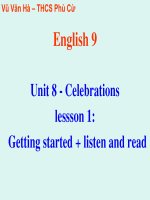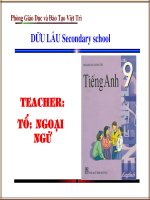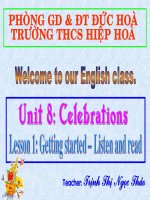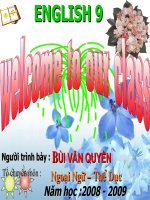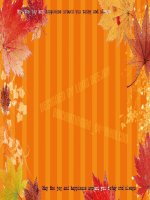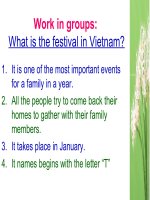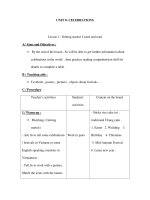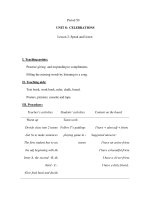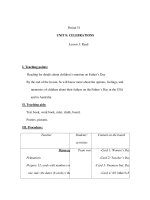Unit 8 Celebrations
Bạn đang xem bản rút gọn của tài liệu. Xem và tải ngay bản đầy đủ của tài liệu tại đây (40.7 KB, 3 trang )
<span class='text_page_counter'>(1)</span>WORD FORM ( dạng của từ ) I/ Noun: (Danh Từ). 1. Sau động từ "be" hoặc "linking verbs": feel, seem, sound, become, get, look....... 1. Sau mạo từ: a, an, the. 2. Sau tính từ sở hữu: my, her, your, his, their, our.. 2. Sau trạng từ 3. Trước danh từ. 3. Sau dấu sở hữu cách: 's. III/ Verbs ( động từ). 4. Sau đại từ chỉ định: this, that, these, those.. 1. Trước hoặc sau danh từ. 5. Sau từ chỉ số lượng: some, any, no, much, many, few, little..... 2. Trước hoặc sau trạng từ 3. Sau giới từ + Ving, sau: Be/have + Ved,V3. 6. Sau giới từ: on, at, in, to, about, for, with, without...... IV/ Adverbs (Trạng từ). 7. Sau tính từ. 1. Trước động từ hoặc sau động từ (ở cuối câu). 8. Trước hoặc sau động từ ( làm chủ ngữ hoặc tân ngữ ). 2. Trước tính từ. II/ Adjective: (Tính từ). 3. Ở đầu câu và sau chỗ trống có dấu phẩy. EXERCISES - WORD FORM. 1. Uncle Ho's Mausoleum is an ............................................. building. (impress) 2. What a ............................................... football match! We enjoyed it very much. (friend) 3. We are really ................................... by the beauty of Ha Long Bay. (impress) 4. When Bob visited Vietnam, he was impressed by the Vietnamese 's ...................... (friend) 5. He made a deep ................................. on the members of his class. (impress) 6. His .......................... made us happy. ( friend) 7. A lot of ........................ come to Van Mieu every day. ( visit) 8. My mother is more .......................... than Mrs Green. (beauty) 9. The Smiths enjoyed the ........................... atmosphere in Viet Nam. (peace) 10. Ha Noi is not ............................ from Kuala Lumpur. (difference) 11. We went to see many .................... places in Ha Noi. (fame) 12. The ........................ language in Malaysia is Bahasa Malaysia. ( nation) 13. In Malaysia ............................ is free. ( educate) 14. Vietnamese people are very ......................... and hospitable. (friend) 15. I always do the test ........................... (care) 16. I am ........................ grateful to you for your help. ( true) 17. Music and painting are ......................... subjects. ( option) 18. How ...................... those students were singing. (happy) 19. English is .................. used in the world. (wide).
<span class='text_page_counter'>(2)</span> 20. The children are playing .................... in the school yard. (happy) 21. Maths and Literature are ................................ subjects for children. (compulsion) 22. The decision was made in the ....................................interest. (nation) 23. He ......................................... agreed with much of what she said. (silent) 24. ..........................................., she passed the exam. ( lucky) 25. We are always ................................. of our history. ( pride) 26. He takes a great .................................. in his good result. (proud) 27.He's a famous ..................................... (correspond) 28.Many ...................... come to Ho Chi Minh City every day. (visit) 29. What is the main language of ......................................... at that school. (instruct) 30. We were very ...................... with the show last night. (bore) 31. He is a ................. person. He makes me.................. (bore) 32. The big garden helps........................................... the house. ( beauty) 33. He felt too ............................. at the test. (disappoint) 34. The studentss are very ................................... about their exam result. (excite) 35. What an .......................... record our players set! (amuse) Hãy so sánh từng cặp ví dụ sau:. [I was disappointed with the film. I. Boring/Bored. expected it to be much better.. Jane’s job is boring, so Jane is. Tôi thất vọng về bộ phim. Tôi đã nghĩ rằng. bored. (không nói ‘Jane is boring’). nó hay hơn nhiều.. Công việc của Jane nhàm chán, vì vậy Jane. ==> Các tính từ có đuôi -ed được dùng. thấy chán nản.. khi một người nào đó cảm thấy thế. Interesting/Interested. nào về thứ gì đó. Nói đơn giản là -ed. Julia thinks politics is very interesting. Julia cho rằng chính trị rất thú vị. Julia is very interested in politics.. thường được dùng với chủ ngữ là người. Các tính từ đuôi -ing được dùng khi. Julia rất quan tâm đến chính trị.. thứ gì đó/người nào đó khiến cho bạn. Surprising/Surprised. bạn cảm thấy như thế nào. Nói đơn. It was quite surprising that he passed the. giản là -ing thường được dùng với chủ. examination.. ngữ là vật.. Thật đáng ngạc nhiên là anh ấy đã thi đậu. Ví dụ đuôi -ing dùng với chủ ngữ là người Everybody was surprised that he passed. George always talks about the same thing.. the examination.. He’s really boring.. Mọi người đều ngạc nhiên là anh ấy đã thi. George luôn nói về cùng một việc. Cậu ấy. đậu.. thật là chán.. Disappointing/Disappointing. He is interesting ( for you) to talk with. The film was disappointing. I expected it to. Nói chuyện với anh ta thì rất thú vị. be much better.. Did you meet anyone interesting at the. Bộ phim thật thất vọng. Tôi đã nghĩ rằng nó. party?. hay hơn nhiều..
<span class='text_page_counter'>(3)</span> Anh có gặp người nào thú vị ở bữa tiệc không?.
<span class='text_page_counter'>(4)</span>
